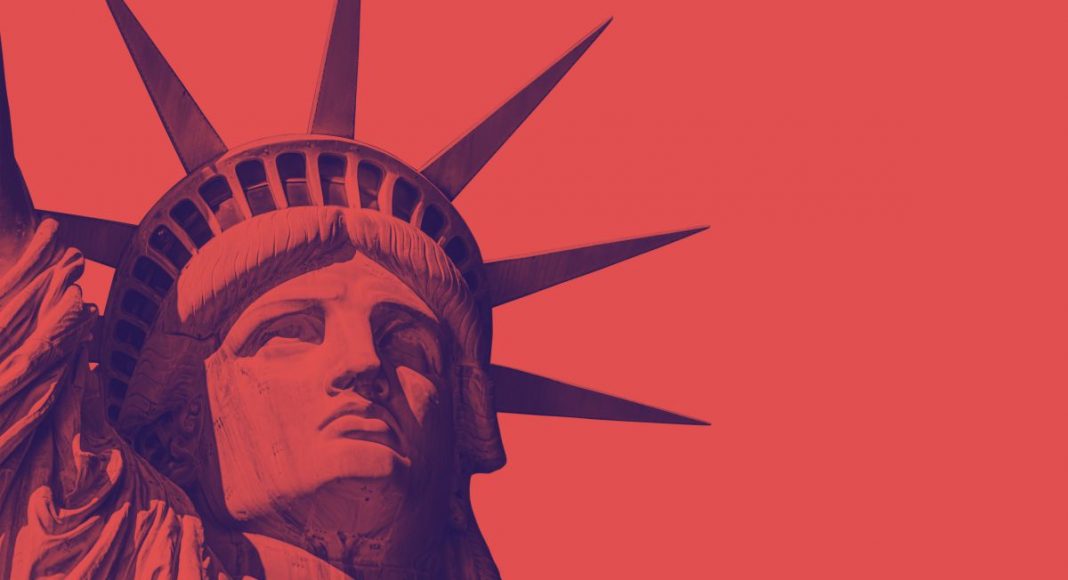In the past 30 years, liberalism has not lived up to its promise to deliver economic returns for the broad majority of society. But despite liberalism’s failings, it is superior to the alternatives.
The prevailing liberal order in America is at breaking point. And the criticisms of liberalism are not without merit. Liberalism, like all other systems of economic and political organization, is judged on its outcomes. That outcome in the West has been economic stagnation for about half the population.
What is so difficult about our current situation is that it pits two moral rights against each other. The first is the moral right of technological progress and globalization, with their potential to lift billions out of poverty worldwide; the second is the moral right of aiding the working and middle classes in the West who have seen their earnings potential decimated by advances in technology and globalization.
If we uniquely choose either right as the way forward in public policy, then we will create profound harm amongst the right not chosen, and thus even further the outrage. So, we must muddle through a middle ground. That is perhaps not as satisfying, emotionally and intellectually, but it is the only responsible way.
Liberalism is now being threatened by old wine in new bottles, particularly socialism and authoritarian capitalism. We must pursue moderation because, despite liberalism’s failings, it is superior to these alternatives.
Liberalism means different things in different places, but it can be generally understood as the system that gives us representative democracy and competitive markets. It is the basis for universal human rights and for treating individuals as autonomous. It has given us most everything we cherish about political society, including the right to privacy, the vote, and free expression. Liberalism is the foundation for the innovation society, which has yielded technologies such as the internet and the possibility for human flourishing at a scale never before achieved in history. For thousands of years pre-liberalism, most humans suffered in serfdom or worse.
When the world entered its second major global war in 1939, four streams of political order were in stiff competition with each other—colonialism, fascism, liberalism, and communism. France, Japan, and the UK were exemplars of the first; Germany of the second; the United States the third; and the Soviet Union the fourth.
As the latter two countries emerged dominant from that war, it was no surprise that the post-war equilibrium would be a cold conflict between liberalism and communism. Britain, Germany, France, and Japan all abandoned their old orders and embraced liberal society to varying degrees. The 1956 Suez Crisis was perhaps the last major gasp of colonial instinct from its deepest progenitor, the United Kingdom; but in that crisis, the United States, to which Britain was by then so deeply beholden, made it amply clear that liberalism was the only way forward.
By the late 1980s, socialism was teetering on collapse. It had failed to deliver on its promises, and soon liberalism emerged as the sole major political order for the world. Pundits such as Francis Fukuyama declared the “end of history” with this liberal triumph.
“The roaring nineties were ironically the last decade over which liberalism in the West has provided real economic returns for the broad majority of society. “
But in the shadow of this triumph were laid the seeds of liberalism’s own undoing. The roaring nineties were ironically the last decade over which liberalism in the West has provided real economic returns for the broad majority of society. Three major developments were at play here.
First, with the collapse of liberalism’s only serious competitor in communism, elites in liberal societies turned away from protecting the liberal order against external threats towards their own enrichment. The leadership principle of country before self was abandoned in favor of pursuing self-interest, even at the top. US presidents and UK prime ministers became more focused on monetizing the power of their office than was common for their post-war predecessors—contrast the retirement activities of Bill Clinton and Tony Blair to those of Jimmy Carter and Margaret Thatcher. The rules of the game in Western liberal societies increasingly have become skewed in favor of protecting the elites’ advantages of incumbency.
Second, liberalism expanded rapidly across the globe. And in its homeland, the United States, it has become the victim of its own success worldwide. The competition from newly liberalizing societies such as India and China (where liberalization is uniquely economic, not political) has stifled the economic benefits of liberalism amongst less well-off Americans.
Third, since the 1990s, automation and information technologies have been advancing at a faster pace than is possible for many to re-skill to remain competitive in a liberal market-economy. The threshold at which people can earn flourishing wages conditional on their innate abilities is now likely higher than it has been at any point since the last world war. True, that technology is also making basic services cheaper, so that it is easier for people to live off (even comfortably) a universal basic income funded by taxes on elites. In fact, several tech elites, including Mark Zuckerberg, propound this solution. But if you want people to live (let alone flourish) off public payments, it is no longer a liberal society, at least not in the economic sense. The recipients become beholden to the state and its ever more elite taxpayer base.
So liberalism must respond to these critiques. The objective ought to be to allow liberal society to progressively shape and adapt to the pace of technology and globalization.
Empires are built on uneven appropriation of scarce resources; those within the empire get more than those outside. The American liberal empire was so constructed. As that equilibrium shifts, and more of the scarce resources flow to those outside the empire, the insiders lose their relative edge. Here, they might lash out externally. If they succeed, they can keep the empire going a little longer. But unless the empire adapts to the new reality, it will eventually fall.
Over the long run, the only way an empire can keep going is by growing— if not spatially, then through the opportunities it provides its citizens. And so, if liberalism and the American liberal empire wish to survive, they must allow for an expansion of opportunity. Such an expansion will invariably dilute the incumbent benefits to some insiders. To make this palatable, we need more compromise in politics. Compromise that helps the insiders accept that expansion of opportunity, without being so stifling of it. Both Democrats and Republicans will need to step back from their ideological dogmas and be more pragmatic in rhetoric and public policy.
Failing which, we will see a retreat of liberalism—and with it a retreat of societies built on liberal values. The American liberal empire, like most other empires before it, will not fall because of external threats; it will fall because its own people will no longer see value in it.







